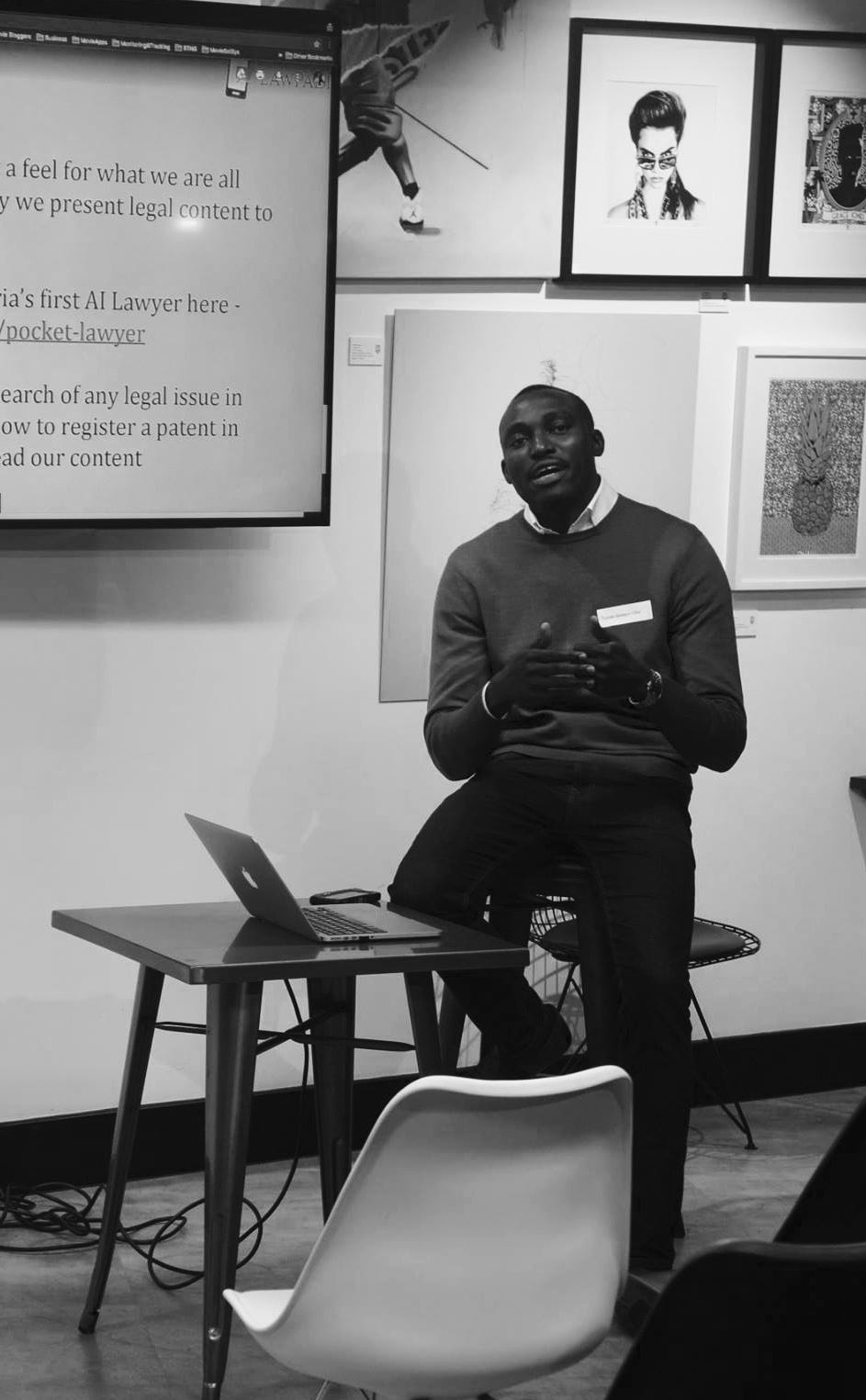Introduction
Valerie is a force of nature — bubbly and go-getter extraordinaire, author of The JJC Handbook and Founder / CEO of Ebony Street Market (ESM). ESM is an online marketplace that brings African artisan products to discerning customers in the U.K. I found ESM interesting, as it appeared to be a startup that threads the intersection of social responsibility and profit-oriented mindset, with an excellent balance.
I was intrigued to know more. We met up at The London Grind and below is an edited version of our conversation. Enjoy.
Papa: Who’s Valerie Kerri?
Valerie: I’m a small girl from Nigeria that has big dreams of making it. My goals are constantly changing, but whatever they are at the time, I’m just trying to achieve it in any way I can (ahh only legal ways I must add). As a person, I would like to think I’m down-to-earth and always up for a laugh, with my dry jokes.
Papa: When you say a ‘small girl with dreams of making it’ — what do you mean by that?
Valerie: For as long as I can remember, I have wanted to leave my mark in the world. For example, I’ve always loved beautiful clothes and thought of owning my fashion line. In my undergraduate days back in Madonna University, a lot of my friends wanted to know where I got my outfits and this gave me an idea to sell clothes. I did this part-time for a few years. Fast forward to today, and I have a T-shirt line called ‘Awele Kerri’ which has Nigerian slogans emblazoned on casual shirts.
I’ve also been interested in technology and quite conscious of its impact on everyday life from a very early age. My interest led me to work as the COO of Nigerian company called Pliris Mobile, which made made-in-Nigeria handsets. Much later on, I founded a consulting firm where I worked with clients to meet their business goals using technology by building their online presence.
Over time, I realised that I was good at selling and building things. I might not be perfect at everything, but I have been able to do part or all of the things I am good at with my startup ESM right now.
Another keen interest of mine is telling stories and was how I wrote and published a book — The JJC Handbook — that was surprisingly well received.
The point is that I’ve always tried so many different things that I enjoy it or have a passion for and I’m constantly chasing my dreams as they evolve.
Papa: Let’s talk a bit about your book — The JJC Handbook; I know it’s a collection of wisdom nuggets for immigrants — what prompted you to write it? And how well did it do?
Valerie: The JJC handbook was my diary. There was a period in my life when I kept a journal and insisted in writing in the 3rd person like I was writing to my younger self. I wasn’t writing daily, but it was constant enough to touch on things that happened to me. A lot of them where I usually took what can be called ’not the best cause of action’, because I didn’t know better and to deal with my failures I wrote down the right way to do it as a coping mechanism. It was funny to read as I was usually mocking myself while advising on what I should have done in certain situations. It was a ‘Real talk’ kind of diary.
At some point, reading back on my journal, I realised that I wished I had a book like that when I came to the U.K. One day someone read my diary (which at the time annoyed me to no end). Anyways, he said it was excellent and encouraged me to publish it. I then reached out to a friend — Tolu Akinyemi, who also happened to be a prolific writer and author of several books and he also encouraged me to publish. He ended up drawing the handbook’s art cover as a birthday gift.
I listened to their advice and went researching how to self-publish my book and ended up using Createspace (Amazon). On the day I had the edition published, I posted it to a few sites including Okada books. I vividly remember that weekend as my partner and I went to France for a short break, however, as we were not in the U.K, I couldn’t check my emails every day because of data charges. As it turns out, for every copy purchased on Okadabooks, I get a notification email, and when we got back to the U.K, I was convinced that their system was hacked or corrupted because I got hundreds of emails coming from Okadabooks.
Next thing I knew, there was a post on Bellanaija titled ‘This book might just save your life’ about my book and reading the comments was amazing, that little me could touch so many people. I cried. Since then, there have been quite a few interviews and reviews, and I am looking to finish my next book.
Papa: That’s amazing indeed! I also heard you talk about your startup Ebony Street Market (ESM) at a BTNG event, can you tell me a bit more about your journey?
Valerie: ESM market is a combination of the things that I love most; running a business, helping people by connecting to others, growing businesses, not to forget, fashion and beautiful things.
ESM is a multi-vendor e-commerce store that brings unique and carefully curated products to customers. You can call it e-bay for black-owned businesses. Customers can find unique and spectacular items that they frankly can’t get elsewhere. We also consult on behalf of our partners concerning structure and operations of their business, branding, and marketing.
For me, ESM has also enabled a streamline of my operations by closing other stand-alone businesses I was involved and merging it all into one pot.
Papa: Marketplaces are always hard to execute for all the obvious reasons. In your case, how do you get a product purchased from someone in Nigeria to the customer based in U.K in a reasonable timeframe?
Valerie: When a partner signs up, they go through a vetting process. The vetting process covers training which clarifies fundamental questions like; how do you deliver a product, handle customer service, etc.
We also offer a guarantee to customers. The guarantee means if for some reason, a seller doesn’t deliver, goods damaged in transit or whatever the reason a buyer is dissatisfied and wants a refund — we refund. That’s our guarantee.
Papa: How’s been reception?
Valerie: Like most startups, we made a lot of assumptions which we could only test once we launched. The first two weeks after launch were spent fixing bugs and making sure the platform worked as expected. To be honest, we felt we lost a bit of momentum, but we’ve more than recovered and doing well.
With the necessary improvements done, we’ve now in a better place and getting a lot of interest within the community. For instance, we had a segment on Colorful radio and got a lot of sales from that. We also recently completed a rebrand and refresh of our site, which has helped us with organic traffic and we can see an increase in completed transactions.
Overall, we are now in a good place where we’re able to think of getting more partners unto our platform because we’re now confident we can help customers to shop without hassle.
Papa: Well done. I have to say you are a published author, and of course, run a startup. I think that’s all pretty impressive. Are you without fear? Or is there any advice you can give someone hoping to do impossible things?
Valerie: I don’t think there’s anyone without fear. However, when I was growing up, my mum would always say the people succeeding didn’t have ten heads. This is the same thing I tell myself all the time. I think anyone can do anything — if they put their mind to it. And if someone has done it before you have no excuse at all.
The good thing about the internet is that most information is freely available to anyone. When I had to publish my book, I could research how to go about self-publishing without any prior knowledge. When it was time to start ESM, it was the same thing — I had to research, but I found the information.
One thing I would say is that, you shouldn’t beat yourself too hard if you don’t hit your goals all at once — but you need to clarify your priorities so it doesn’t bother you if you don’t tick everything off.
If you drop some balls — it’s okay- don’t be so hard on yourself but learn from your mistakes. I gave a talk ‘Can you have it all’ in February at the Reel talks seminar. I think a few people expected that I would say you can have it all. Instead, my position is that you can’t-do it all, but you can do what you want, those things that are important to you. To me. And I try to be amazing at those things.
Papa: Not limiting it to tech, where do you hope to have a long-lasting impact?
Valerie: Let me tell you a little story about something that brought fulfillment to me. A few years ago, I was living in Surrey and was feeling stuck personally, I sat down and realised that nothing I was currently working on was bringing me joy that comes with fulfillment. So I sent a message to my friend to moan as you do….He said well an Igbo group called ICSN was having a BBQ event this weekend– and suggested I come out, meet people and have some fun. I didn’t attend that event, haha.
A few months later, I got a notification on Facebook about another event by ICSN and decided to attend. I got to the venue and realized there was an election for the governing body of the society. I sat there and listened to people stand up and speak about what they will do for the community if they were elected. It was electrifying!
I had decided to put myself forward….I stood up and spoke passionately about how I will contribute to help the society. It must have been convincing because I got elected!!
During the time spent serving on the executive board for the society, it was such a joy to see other people learn the Igbo language, attend events, make new friends, and everyone felt like family. This is the same joy I feel when I work with a partner from Nigeria on ESM whose art or product ends up in a Customer’s house here in the U.K. Or when a new business owner does a product launch using a new website I helped them to build and people can find them online.
The point of my story is that anything that allows me to give back and watch people grow positively- gives me fulfillment, and this is how I hope to have a long-lasting impact.




















